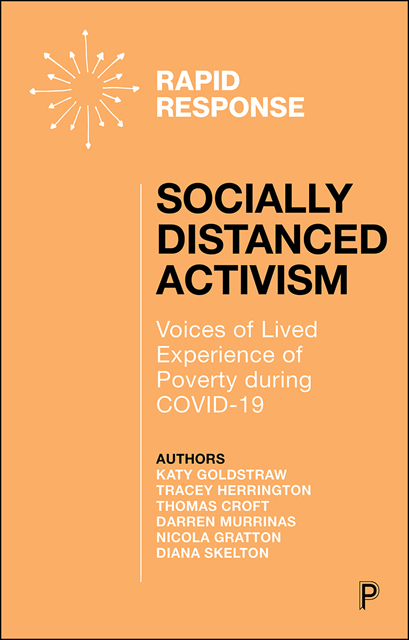Book contents
- Frontmatter
- Dedication
- Contents
- Acknowledgements
- Introduction: our voice means something
- 1 “Why aren’t we heard with our voices?” APLE Collective’s lived experience of poverty
- 2 APLE Collective and pandemic activism
- 3 Thriving women
- 4 ATD Fourth World: overcoming epistemic injustice globally
- 5 Finding a place in a disconnected world: Expert Citizens and Keep Talking
- 6 Conclusion: power, voice and change
- Notes
- References
6 - Conclusion: power, voice and change
Published online by Cambridge University Press: 14 April 2023
- Frontmatter
- Dedication
- Contents
- Acknowledgements
- Introduction: our voice means something
- 1 “Why aren’t we heard with our voices?” APLE Collective’s lived experience of poverty
- 2 APLE Collective and pandemic activism
- 3 Thriving women
- 4 ATD Fourth World: overcoming epistemic injustice globally
- 5 Finding a place in a disconnected world: Expert Citizens and Keep Talking
- 6 Conclusion: power, voice and change
- Notes
- References
Summary
This book has tracked the journey that the APLE Collective have taken through socially distanced activism. Written with three of APLE Collective’s founding organisations, it has interrogated what the term ‘lived experience’ actually means, concluding that it is about having the power and praxis to analyse and interpret your own truth, to speak truth to power. The APLE Collective’s pandemic activism has reflected on the importance of participatory and coproduced methodologies to find voice.
By examining three perspectives and experiences of socially distanced activism, written about by Thrive Teesside, ATD Fourth World and Expert Citizens, this book has critically reflected on the term ‘lived experience’, reaffirming the importance of people with direct experience of poverty taking ‘voice-space’ (Lister, 2020:2). Chapter 3, Thriving women, examined voice gender and women’s creative resilience in response to austerity measures and COVID-19 in Teesside. Chapter 4 questioned epistemic injustice and reflected on the intersections of voice and power from a global perspective. Chapter 5 reflected on the importance of maintaining both social and working relationships to maintain voice and uphold community action. This concluding chapter will draw together the main themes of the book and share key learning points that the APLE Collective have collaboratively gathered on how to do socially distanced activism.
Recognising the messy, contested nature of holding democratic voice
The central task of epistemology is to explain the nature of knowledge, yet the criteria for knowledge formulation are far from obvious (Pritchard, 2014) and have kept philosophers in critical conversation for centuries. However, it is only relatively recently that the social nature of knowledge production has begun to be recognised by epistemologists and seriously studied. The sharing of knowledge needs to recognise and welcome the ‘messy reality’ (Sparke, 2008) of knowledge as it is socially produced. That there are multiple forms of knowing is key to decolonising methodologies (Smith, 2013) and recognising the legitimacy of storytelling, artistic knowledge and non-literate knowledge is fundamental to recognising the multiplicity of expertise by experience.
I lack imagination you say
No. I lack language.
The Language to clarify my resistance to the literate … .
(Cherrie Moraga, in Anzaldúa [1983:166])
- Type
- Chapter
- Information
- Socially Distanced ActivismVoices of Lived Experience of Poverty During COVID-19, pp. 113 - 121Publisher: Bristol University PressFirst published in: 2023



